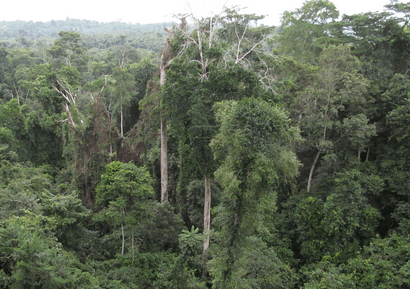Ghana implements interventions to address issues of deforestation
 Mr John Peter Amewu, Ghana’s Minister of Lands and Natural Resources has said Ghana has committed itself in implementing a number of interventions to address the issues of deforestation and forest degradation to mitigate the impact of climate change.
Mr John Peter Amewu, Ghana’s Minister of Lands and Natural Resources has said Ghana has committed itself in implementing a number of interventions to address the issues of deforestation and forest degradation to mitigate the impact of climate change.
Speaking at a World Bank side event at the ongoing climate summit in Bonn, Mr Amewu said interventions including; reducing emissions from deforestation and forest degradation through the implementation of the Ghana Forest Investment programme and the REDD+ project being funded by the World Bank and a national REDD+ strategy which would be implemented in the next 25 years have been put in place.
He said cocoa farmers are encouraged to engage in climate smart cocoa production by plating improved seeds and increasing the number of forest trees per ha of cocoa at least 19 trees per ha.
He said undertaking tree policy reforms, and benefits sharing arrangements to motivate farmers to leave more trees on their farms during land preparation adding that the absence of this had led to the destruction of farm lands.
He mentioned development of timber procurement policy which ensures that only legal timber was used for government projects as one of the interventions.
The Prince of Wales cocoa forest initiative seeks to address deforestation and forest degradation caused by cocoa production under which Ghana and Cote d’Ivoire which together produce over 60 percent of the world’s cocoa have prepared a Joint Framework of Action to address deforestation and forest degradation.
He said the interventions were undertaken in response to what is stipulated in the Africa climate business, under resilient landscape in forested landscape.
Mr Amewu noted that any efforts towards addressing this issue should also tackle poverty and over dependence on the forest for livelihoods especially in developing countries.
He said climate change adaptation and mitigation measures should be adopted and integrated into Ghana’s national development agenda, adding that developing countries should be supported with grants to engage in landscape restoration efforts in degraded lands.
The main objectives of COP23 are to continue the global climate action platform that was initiated in Marrakech during the COP22, negotiate the Marrakech on GCA particularly the Nationally Determined Contributions of parties, take stock of the performance of the institutions established under the Paris Agreement and assess the level of financial contribution from the developed countries to the developing countries as enshrined in the convention.
Key thematic areas are adaptation, mitigation, technology transfers, capacity building and finance.
Current decisions on climate change education includes; empowering capacity of young people to implement climate actions.
Information made available to the GNA from the Ghana delegation indicate that bi-lateral funding, was underway with the African investment based in China to implement climate change and green economy leaning strategy.
On climate finance, parties have expressed concern of its inadequacy, effective tracking and have also expressed concern about the gap between climate action and support.
For example various plans have been prepared in the areas of adaptation, mitigation and technology needs assessment but there has been inadequate financial resources to implement them.
Source: GNA
